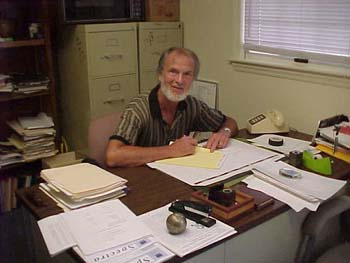Dr. Michael W. Cronin
B.S.
University of Vermont
M.A. Wayne State
University
Ph.D. Wayne State
University
CONTACT
200 Jefferson St.
Room.4B
Phone: (540) 831-5750
E-mail: mcronin@radford.edu

Dr. Cronin is Professor of
Communication. He has
taught public and group communication at Wayne State University, the
University of Vermont, and Radford University.
Dr. Cronin has done extensive consulting for government, private,
and educational institutions in listening, public communication, and job
burnout. He is completing a
book on job burnout and has done numerous convention programs and
publications. Dr. Cronin is
the recipient of the 1985 Radford University Foundation Award for
Excellence in Teaching. Dr.
Croninís primary teaching duties include Research Methods, Teamwork
and Communication, Semantics, Communication Strategies for Countering
Job Burnout, Public Speaking, and Argumentation and Advocacy.
Q:
Dr.
Cronin, how would you describe the courses you teach?
A:
The
first course, Research Methods is about doing research and evaluating
research methods. The second course is Teamwork and Communication, which
is basically learning how to function as a group. It is about how to
operate keeping a collective aim in view. The class on Semantics is
about interpreting and using language more effectively. The class on Job
Burnout is about actually trying to find remedies to this particular
problem. The Public Speaking class is about preparing for public
presentations. The class on Argumentation and Advocacy deals with how to
be a better logical thinker.
Q:
What
method of teaching do you use in these classes?
A:
I use enough theory to do justice to the practical training. I do
not teach theory for the sake of theory. The main focus of my courses is
application. A thorough
understanding of the functional aspect of these courses is required. I
try to get students to raise their personal standards to a certain level
and then I try to get them to achieve those standards.
Q:
Since
the graduate program focuses on applied communication,
do you think that students with one specific background or
undergraduate degree will do better than others?
A:
Actually
I would say that many
different backgrounds are welcome in our graduate program.
The more the better; this makes the class of entering students
more diverse and therefore able to provide more perspectives.
Q:
What
are your expectations from students who wish to take your classes?
A:
I
expect each of my students to work hard, work effectively alone and with
others, and carry a fair share of the work. I also expect them to
contribute to the collegiality of the department and participate in
social events that the department organizes throughout the year.
Q:
How
useful to an undergraduate or graduate studentís future professional
aspirations do you think these courses are?
A:
The
purpose of these courses is not job creation. But within that context,
these courses do give students that extra edge that helps them get
closer to their desired goal. Employers
always want people who can think ahead clearly; the Argumentation class
definitely helps in that. Some
employers want people who can conduct research, and the research class
helps you learn that. Then almost every employer wants people who can
work in a team, and no employer wants you to burn out on a job.
Therefore, all the classes are equally helpful. In fact, years
ago we conducted a research study which showed that employers in the
neighboring four states including Washington D.C. rated good
communication skills of prospective employees as highly as having an
advanced degree. Learning
good communication skills is central to our program.
Q:
What
would be your advice to students just entering the graduate program?
A:
Challenge
yourself with high standards; you will be surprised how often you can
live up to whatever standard you set
|